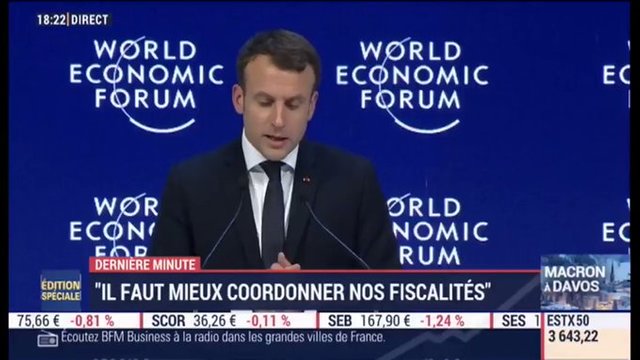
Today, France and the European Union will be at the heart of our chronicle. They are both trying to catch up with the digital currencies by proposing new initiatives.
France: IMF to oversee global finance
After holding a summit with world leaders in Versailles, Emmanuel Macron spoke at the World Economic Forum in Davos.
He declared:
I am in favour of the IMF having a mandate to monitor the entire international financial system, where whole sections of the financial system are not regulated. Like bitcoin, cryptomone or shadow banking." Emmanuel Macron

For the French President, it is necessary to broaden the IMF's prerogatives. According to him,"the most aggressive" actors should be subject to control by the organization. It includes in this category cryptomonnaies and shadow banking. shadow banking refers to all activities and players contributing to the non-bank financing of the economy. It includes organizations ranging from merchant banks to clearing houses, such as the one used by WEC to manage its security deposits. This parallel banking system accounted for more than $92 trillion in 2015.
IMF: international cooperation needed
The International Monetary Fund (IMF) is a United Nations organization that promotes global monetary cooperation and financial stability. He called for global coordination on cryptocryptomy to prevent the risk of price hikes.
According to a Bloomberg report, IMF spokesman Gerry Rice said at the end of last week that there is a need to "intensify international discussions and cooperation among regulators".
Rice added:
When asset prices rise rapidly, risks can accumulate, especially if market participants borrow money to buy. It is important that people be aware of the risks and take the necessary risk management measures." Gerry Rice
Christine Lagarde, director of the organization, said in September 2017 that cryptomonnaies could be serious competitors for traditional currencies and that it was unwise to ignore them.
She added that cryptocurrencies would bring "massive disruption" and warned that central banks and financial services should pay more attention to technology.
European Union: regulation moves forward
ESMA: regulatory proposal for difference contracts
The European Securities and Markets Authority (ESMA), an independent market surveillance body, is seeking public input into the development of new rules on cryptomonnaise-derived contracts.
ESMA invited comments on the Cryptocryptomy Difference Contracts (CFDs) to determine whether they comply with the Markets in Financial Instruments Directive.
CFDs sold throughout the EU are attracting increased attention from regulators as investors "are exposed to a significant risk of loss". CFD products are extremely complex and investors have too little knowledge to understand the underlying risks.
The European regulator stated in its document:
In this context, ESMA is currently examining whether CFDs on digital currencies, whose underlying assets have shown very high price fluctuations, should be taken into account in the measures and whether an initial 5:1 leverage would provide sufficient protection for investors. Alternatively, a lower leverage (2:1 or 1:1) or stricter measures (such as a ban on the marketing, distribution or sale of cryptomonnaise-based CFDs) could be considered ".
ESMA explained that capping the leverage limit at 5:1 would mean that investors would only have to pay 20% of the CFD's total value. On the contrary, a leverage effect of 2:1 would mean that investors would have to pay 50% of the CFD's value.
In December last year, the UK's Financial Conduct Authority (FCA) issued a warning to investors about cryptographic CFDs in December, describing the financial instrument as an "extremely risky speculative investment".
European Commission: a round table at the summit
An EU commissioner plans to organise a meeting of public and private sector stakeholders to discuss the impact of cryptocurrencies on central banks. Valdis Dombrovskis said in an address at a press conference for the Economic and Financial Affairs Council (ECOFIN):
Cryptomone coins can have ramifications in many other areas, including for central banks. That is why I intend to bring together key authorities and the private sector in the near future. In order to assess the long-term situation beyond current market trends." Valdis Dombrovskis
However, the potential involvement of central banks in digital currencies has met with mixed reactions. While some predict that central banks will buy cryptocurrencies to strengthen their foreign exchange reserves. More people are saying that the objectives of bankers and cryptographic buyers are too different to reconcile.